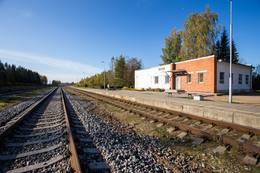Echelon
Echelon (French - échelon, English - echelon, Russian эшелон) - depending on the context, the term is used to denote:
part of the army layout; ie, moving, the avant-garde is followed by the army's first echelon, then the second, and so on.
train composition for single purpose freight and people (also used for military trains), ie special purpose train composition.
In the military sense, echelon means the arrangement of parts of the military formations in a tactical, operational or strategic order designed to perform various tasks in different directions (districts) or different spheres of the theater of war.
More information sources
Category: Tactical units. Art Encyclopaedic Dictionary of History. https://vesture.eu/Category:Tactic_Units
Эшелон (военное дело). Википедия. https://ej.uz/qgwi
Related objects
Luggage railway station
Located 3 kilometers from the city of Valka, on the left side of the highway Valka - Inčukalns (A3).
During World War II, the railway line Riga - Valka was of special importance. It served as the main supply artery for the Leningrad Front for the German army. The luggage station was established in 1942 as a precinct for the formation of military echelons in Valka. It had 12 tracks. The tracks between Lugaži, Valka and Valga stations, which formed a triangle with each other, were also...




